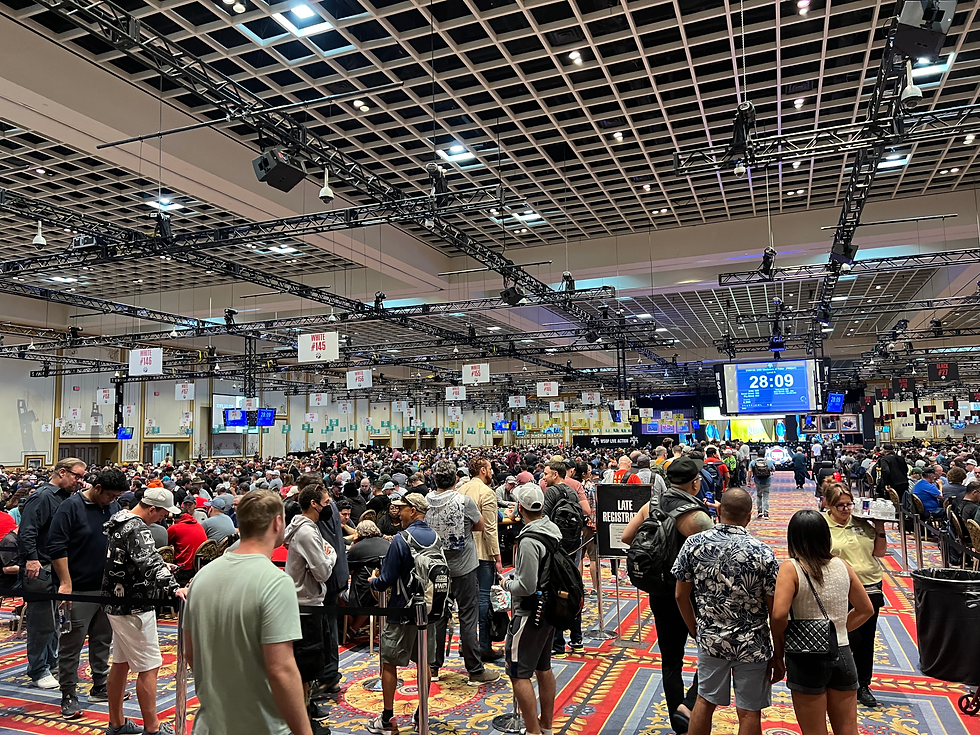How to Become a Poker Pro: The Real Path Nobody Talks About
- Ashley AKA Pokerface Ash

- May 20, 2025
- 4 min read
Every year, thousands of poker players dream about going pro.
They imagine the freedom — no boss, no 9-to-5, just cards and cash games and cross-country flights to the next big event. They watch the vlogs, they follow the chip leaders, and they start to believe: “Maybe I could do this.”
But the truth is, becoming a professional poker player has almost nothing to do with talent, luck, or how often you win big.
It has everything to do with how well you make decisions under pressure, and how consistently you can repeat that process — through the variance, the downswings, and the emotional storms.
Step One: Specialize Before You Scale
If you want to be a pro, stop trying to do everything. One of the most common mistakes up-and-coming players make is spreading themselves thin — a little bit of online cash, some live MTTs, the occasional shot at PLO or mix games. It feels like diversification, but it’s really just distraction.
Pick a format. Commit to it. Become world-class at it.
The best players in the world didn’t dabble their way to the top. They built their edge by going deep — by seeing the same spots thousands of times, by knowing the nuances of every decision tree, and by developing instincts that only come from obsessive repetition.
Step Two: Study Like a Killer, Not a Fan
Watching a few YouTube videos or following hand breakdowns on Twitter is great. But if your study routine feels fun and passive, you’re not training — you’re just being entertained.
Pros study like killers. They run simulations, review leaks, build custom GTO nodes, and document their thought process with the discipline of a scientist. They aren’t trying to prove they’re good — they’re trying to find out where they’re still bad.
This is the hardest shift for most players: dropping the ego long enough to dissect your own play honestly.
When you stop asking “Did I win?” and start asking “Did I make the best decision available?”, you begin to cross the invisible line that separates amateurs from professionals.
Step Three: Detach From Results — Completely
Poker doesn’t care how hard you studied or how well you played. Sometimes, the fish stacks you with bottom pair and a gutshot. Sometimes, you run a brilliant bluff and still get called by ace-high.
If your emotional state rises and falls with your results, this game will chew you up and spit you out.
Pros train themselves to become outcome-independent. They know the variance is brutal, unfair, and relentless — and they make peace with that. They measure their success not by short-term winnings, but by whether they played their range against villain’s range the best way possible in that moment.
This kind of emotional detachment isn’t easy. It requires work: journaling, mindset coaching, meditation, and sometimes therapy. But without it, you’ll never survive the long arc of the game.
Step Four: Structure Your Life Like a Performer
Being a poker pro isn’t just what you do at the table — it’s everything you do around it.
Your sleep, your diet, your emotional regulation, your calendar, your mental clarity. You are not just a grinder. You are a high-performance decision maker. That means you need to treat your life like a pro athlete would: with systems, rituals, and structure that support optimal performance.
No one talks about how exhausting it is to constantly fire on all cylinders — to be present, sharp, and emotionally neutral through 12-hour sessions, travel delays, or soul-crushing bubbles. That’s why the edge isn’t just in your skillset. It’s in your lifestyle.
Step Five: Surround Yourself With People Who Take It Seriously
You will rise or fall to the level of your circle.
If you’re surrounded by weekend warriors and casual players who only care about the fun of the game, that mindset will rub off. You’ll stop pushing yourself. You’ll start justifying mistakes. You’ll slowly drift into mediocrity.
But when you’re in a room full of assassins — when your friends are reviewing sims, talking strategy on Discord, and pushing you to think deeper — everything changes. You level up faster because you’re forced to. You adopt a higher standard without even realizing it.
Step Six: Redefine What Winning Means
The pros aren’t chasing heaters. They’re building inevitability.
They’re not focused on winning today. They’re focused on making the best decisions — over and over again — until variance is the one playing catch-up.
That’s the mental shift that unlocks long-term success. You stop chasing money and start chasing mastery. The chips follow eventually, because they have to. The game has to pay someone. It just usually ends up paying the one who trained the hardest, studied the deepest, and cared the most about being right — not rich.
Final Thoughts
Becoming a professional poker player isn’t a glamorous leap. It’s a slow, deliberate transformation.
You don’t suddenly wake up a pro. You grind like one before the world recognizes you as one. And even then, you keep sharpening. Because this game will never stop testing you — mentally, emotionally, and strategically.
But if you can embrace that challenge — if you can fall in love with the work, the process, the losses, and the breakthroughs — poker will give you something most jobs never can: a life on your terms, built on your brain, and proof that you didn’t just dream it… you earned it.








LOVE all of the wisdom in this. THANK YOU!
Besides your play you need a good bankroll , backer , good sponsors , good friends and family base.